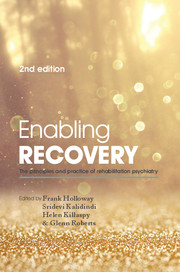Book contents
- Frontmatter
- Contents
- List of contributors
- List of figures, tables and boxes
- Preface
- Part 1 Setting the scene
- Part 2 Treatment approaches
- 7 Treatment approaches: overview
- 8 Rehabilitation at the coalface: practical approaches to helping people improve their functional skills
- 9 Cognitive approaches: cognitive–behavioural therapy and cognitive remediation therapy
- 10 Family interventions
- 11 Working with challenging behaviour
- 12 Working with coexisting substance misuse
- 13 Creative therapies and creativity
- 14 Management of medication when treatment is failing
- 15 Physical healthcare
- Part 3 Key elements of a rehabilitation service
- Part 4 Special topics in psychiatric rehabilitation
- Part 5 Future directions
- Index
14 - Management of medication when treatment is failing
from Part 2 - Treatment approaches
Published online by Cambridge University Press: 02 January 2018
- Frontmatter
- Contents
- List of contributors
- List of figures, tables and boxes
- Preface
- Part 1 Setting the scene
- Part 2 Treatment approaches
- 7 Treatment approaches: overview
- 8 Rehabilitation at the coalface: practical approaches to helping people improve their functional skills
- 9 Cognitive approaches: cognitive–behavioural therapy and cognitive remediation therapy
- 10 Family interventions
- 11 Working with challenging behaviour
- 12 Working with coexisting substance misuse
- 13 Creative therapies and creativity
- 14 Management of medication when treatment is failing
- 15 Physical healthcare
- Part 3 Key elements of a rehabilitation service
- Part 4 Special topics in psychiatric rehabilitation
- Part 5 Future directions
- Index
Summary
Introduction
Pharmacological treatment plays an essential role in the treatment, care and support of people experiencing major mental illnesses. In this chapter we discuss how to assess and then optimise medication management for people with schizophrenia and schizoaffective disorder, the most common conditions resulting in referral to psychiatric rehabilitation services, from the perspective of the clinician taking over responsibility for treatment. We focus on people who are identified as ‘treatment resistant’, that is, remain significantly symptomatic despite standard care, and the practicalities of prescribing clozapine. We have constructed this chapter to address five key issues in medication management: establishing treatment resistance, managing treatment resistance, maximising adherence, managing adverse effects and adhering to the schizophrenia guidelines from the National Institute for Health and Care Excellence (NICE) (2014).
Establishing treatment resistance
The NICE schizophrenia guidelines define treatment-resistant schizophrenia as a lack of satisfactory clinical improvement despite the sequential use of the recommended doses for 4–6 weeks of at least two antipsychotics, at least one of which is a second-generation antipsychotic. Before one can conclude that an individual is treatment resistant, it is important to review thoroughly key aspects of previous and current medication (see Box 14.1).
The clinician should review the patient's history at this stage, which enables a critical evaluation of the diagnosis(es). It is important to consider comorbid or primary disorders that might have been missed, such as an organic mental disorder (e.g. temporal lobe epilepsy) or autism spectrum disorder. Equally, one should review the current symptoms to ensure that treatment is effectively targeting those that are distressing the patient and carers. Reviewing the medication history is important: what worked in the past might be effective again now. Similarly, it is important to assess previous adherence to treatment, drug levels where available and, finally, to evaluate side-effects.
- Type
- Chapter
- Information
- Enabling Recovery , pp. 224 - 238Publisher: Royal College of PsychiatristsPrint publication year: 2015



